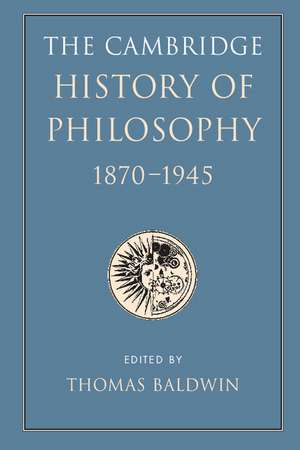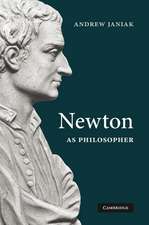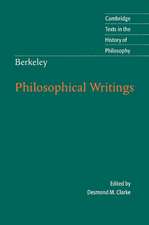The Cambridge History of Philosophy 1870–1945
Editat de Thomas Baldwinen Limba Engleză Paperback – 6 iun 2012
| Toate formatele și edițiile | Preț | Express |
|---|---|---|
| Paperback (1) | 510.68 lei 6-8 săpt. | |
| Cambridge University Press – 6 iun 2012 | 510.68 lei 6-8 săpt. | |
| Hardback (1) | 1380.27 lei 6-8 săpt. | |
| Cambridge University Press – 26 noi 2003 | 1380.27 lei 6-8 săpt. |
Preț: 510.68 lei
Preț vechi: 630.46 lei
-19% Nou
Puncte Express: 766
Preț estimativ în valută:
97.73€ • 101.66$ • 80.68£
97.73€ • 101.66$ • 80.68£
Carte tipărită la comandă
Livrare economică 14-28 aprilie
Preluare comenzi: 021 569.72.76
Specificații
ISBN-13: 9781107628830
ISBN-10: 1107628830
Pagini: 974
Dimensiuni: 152 x 228 x 42 mm
Greutate: 1.52 kg
Editura: Cambridge University Press
Colecția Cambridge University Press
Locul publicării:New York, United States
ISBN-10: 1107628830
Pagini: 974
Dimensiuni: 152 x 228 x 42 mm
Greutate: 1.52 kg
Editura: Cambridge University Press
Colecția Cambridge University Press
Locul publicării:New York, United States
Cuprins
Introduction; Part I. 1870–1914; Section 1. The Dialectical Situation in 1870: Positivism vs. Idealism: 1. The positivist tradition; 2. Neo-Kantianism: the German idealism movement; 3. Idealism in Britain and the USA; 4. Idealism in Russia; Section 2. The Argument Moves on: Pragmatism and the New Realisms: 5. Bergson; 6. Pragmatism; 7. Psychology: old and new; 8. The unconscious mind; Section 3. The New Logic and the Foundations of Mathematics: 9. The new logic: revival, reform, revolution; 10. Foundations of mathematics; Section 4. From Judgement to Language: 11. Theories of judgement; 12. The logical analysis of language; Section 5. Physics and the Philosophy of Science: 13. The atomism debate; 14. Theories of space-time in modern physics; Section 6. Philosophy of History and the Idea of Social Sciences: 15. The German debate and the Geisteswissenschaften; 16. From political economy to positive economics; 17. Sociology and the idea of social science; Section 7. Ethical Theory: 18. Utilitarians and idealists; 19. Nietzsche; 20. The new realism in ethics; Section 8. Legal and Political Theory: 21. Individualism vs. collectivism; 22. Marxism and anarchism; 23. Legal theory; Section 9. Philosophy and Religion: 24. Sceptical challenges to faith; 25. The defence of faith; Section 10. Philosophy and the Arts: 26. Art and morality: aesthetics at 1870; 27. Format and feeling: aesthetics at the turn of the century; Interlude: philosophy and the Great War; Part II. 1914–45; Section 11. Logic and Philosophy: The Analytic Programme: 28. Logical atomism; 29. Logical positivism; 30. The achievements of the Polish school of logic; 31. Logic and philosophical analysis; Section 12. From Idealism and Naturalism to Phenomenology and Existentialism: 32. The continuing idealist tradition; 33. Transformations in speculative philosophy; 34. Realism, naturalism and pragmatism; 35. French Catholic philosophy; 36. Spanish philosophy; 37. The phenomenological movement; 38. Heidegger; 39. Latin American philosophy; 40. Japanese philosophy; Section 13. Perception, Knowledge, Language, and the End of Metaphysics: 41. Sensible appearances; 42. The renaissance of epistemology; 43. The solipsism debates; 44. Language; 45. The end of philosophy as metaphysics; Section 14. Philosophy and the Exact Sciences: 46. First-order logic and its rivals; 47. The golden age of mathematical logic; 48. General relativity; 49. Scientific explanation; 50. The rise of probabilistic thinking; Section 15. Mind and its Place in Nature: 51. Vitalism and emergentism; 52. Behaviourism and psychology; 53. Gestalt psychology; 54. Wittgenstein's conception of mind; Section 16. Philosophy and The Social Sciences: 55. The methodology of the social sciences; 56. The rise of social anthropology; 57. Western Marxism and ideology critique; Section 17. Ethics and Religion: Emotivism, Intuitionism, and Authenticity: 58. From intuitionism to emotivism; 59. Philosophy of religion; Section 18. Literature and Aesthetic Theory: 60. Literature as philosophy; 61. Aesthetics between the wars: art and liberation; Section 19. The Decline of Europe: 62. The liberal democratic state: defences and developments, 1918–45; 63. Hans Kelsen and normative legal positivism; 64. The liberal democratic state – critics; Bibliographical appendix; Bibliography.
Recenzii
Review of the hardback: 'The overall standard of the contributions is high, and there is much to be gained from the brief but incisive essays … a valuable reference work.' Political Studies Review
Review of the hardback: '… The Cambridge History of Philosophy is a magnificent achievement: a superb resource that can be recommended to all philosophers and anyone with an interest in the history of the period.' British Journal for the History of Philosophy
Review of the hardback: '… The Cambridge History of Philosophy is a magnificent achievement: a superb resource that can be recommended to all philosophers and anyone with an interest in the history of the period.' British Journal for the History of Philosophy
Descriere
Over sixty specially commissioned essays by experts in the field, accessible to non-specialists who have little previous familiarity with philosophy.















